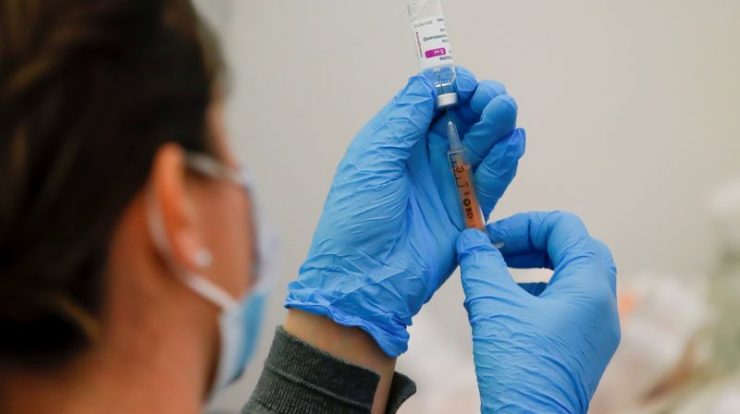
Researchers found that after 21 days of a single dose of these vaccines, new Covid infections had decreased by 65%. (Credit: Reproduction / Unsplash)
British scientists have concluded that a single dose of Oxford-AstraZeneca or Pfizer-BioNTech vaccine against Covid-19 significantly reduces the risk of infection in adults of all ages.
Two studies released on Friday (23) analyzed more than 1.6 million nose and throat swabs collected from 373,402 people between December and April. The data was collected as part of the ongoing Covid-19 infection survey, conducted by the University of Oxford, the UK Office for National Statistics and the UK Department of Health and Social Care.
+ Oxford will pay R $ 35,000 for re-infecting young people with the virus
Researchers found that after 21 days of a single dose of the Oxford-AstraZeneca or Pfizer – BioNTech vaccine, the new Covid infection – both symptomatic and asymptomatic – decreased by 65%.
The data showed that asymptomatic cases decreased by 74% three weeks after a single dose of any vaccine, while asymptomatic cases decreased by 57%. A second dose of the vaccine reduced the overall infection rate by 70%, with asymptomatic Covid infection by 90% and asymptomatic virus cases by 49%.
The researchers compared these effects with the natural immunity obtained by infection with the virus. However, they cautioned that the fact that vaccinated individuals may still be infected – even if this infection is often asymptomatic – means that “continued transmission remains a possibility.”
The study found that vaccines had a similar effect on adults of all ages when it came to lowering infection rates, with a similar ability to reduce infection, regardless of whether or not the participants had long-term health problems.
Scientists also examined the effect of Covid vaccines on participants’ antibody levels. They found that older adults – especially those over the age of 60 – who had never contracted Covid had a lower immune response to a single dose of the vaccine compared to those who had had the virus before.
The data showed that antibody responses to two doses of the Pfizer-BioNTech vaccine were high across all age groups, which means that older adults were able to achieve levels of antibodies similar to those who received a dose of the vaccine after a previous infection with Covid.
Few people received two doses of the Oxford-AstraZeneca vaccine in the United Kingdom for researchers to assess its effect on the antibody response. However, it was noted that immune responses to the first dose differed between the Oxford-AstraZeneca vaccine and the Pfizer-BioNTech vaccine.
Antibody levels increased more slowly after a single dose of Oxford-AstraZeneca compared to the Pfizer-BioNTech alternative – however, antibody levels decreased more quickly after a dose of the latter, especially in the elderly, so that patients achieved similar levels of antibodies against those who had They were seen after the first injection of the Oxford-AstraZeneca vaccine.
The Oxford-AstraZeneca vaccine has been approved for use in the United Kingdom, India, and several other countries, but has faced temporary suspension in some markets due to concerns it may be linked to rare blood clots. Global health officials said the benefits of administering the vaccine still outweighed the risks.
The World Health Organization recommends an eight to 12 week interval between the first and second dose of the Oxford-AstraZeneca vaccine. The Pfizer-BioNTech vaccine is also being administered in many countries, including the United States. The U.S. Centers for Disease Control and Prevention recommends receiving a second dose of the vaccine three weeks after the first.
In February, the United Kingdom launched a trial to investigate whether mixing doses of the Oxford-AstraZeneca and Pfizer-Bio-in-Tech vaccine could be effective.
Also see
+ Career of the Decade – Find out how to enter the profession that the professionals lack, but the vacancies
+ Lemon squeeze trick is going crazy on social media
+ A woman pretends to be an FBI agent to get free food and go to jail
+ Digital blue area changed in SP on 16th; See how it looks
A study reveals the healthiest way to cook rice
Can burping a lot be a health problem?
The shark was caught in MA with the remains of the young missing in the stomach
+ Cinema, Sex and the City
+ Discover a 6,500-year-old copper workshop in the desert in Israel

“Friendly zombie guru. Avid pop culture scholar. Freelance travel geek. Wannabe troublemaker. Coffee specialist.”

:strip_icc()/i.s3.glbimg.com/v1/AUTH_59edd422c0c84a879bd37670ae4f538a/internal_photos/bs/2023/C/5/A4lWrPQSSw0QsBXkdijQ/greve-medicos.jpg)



